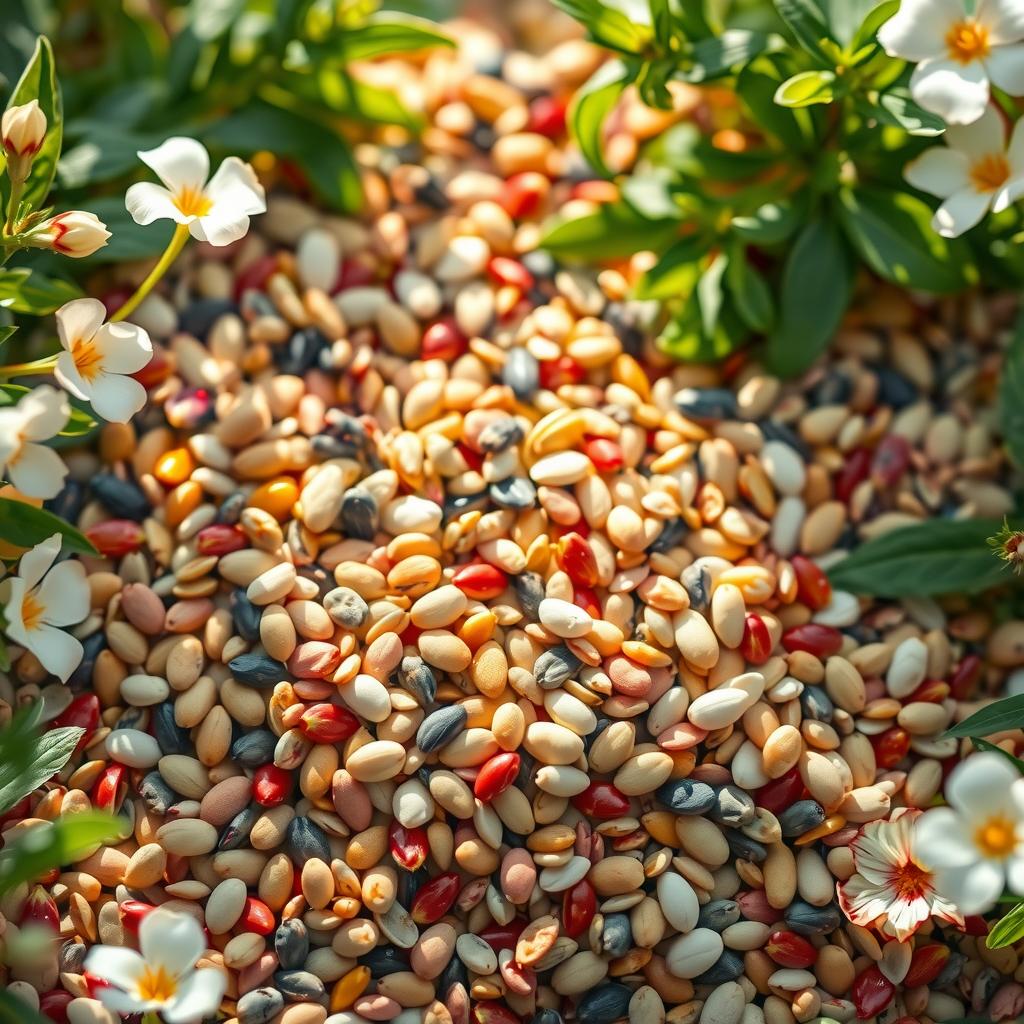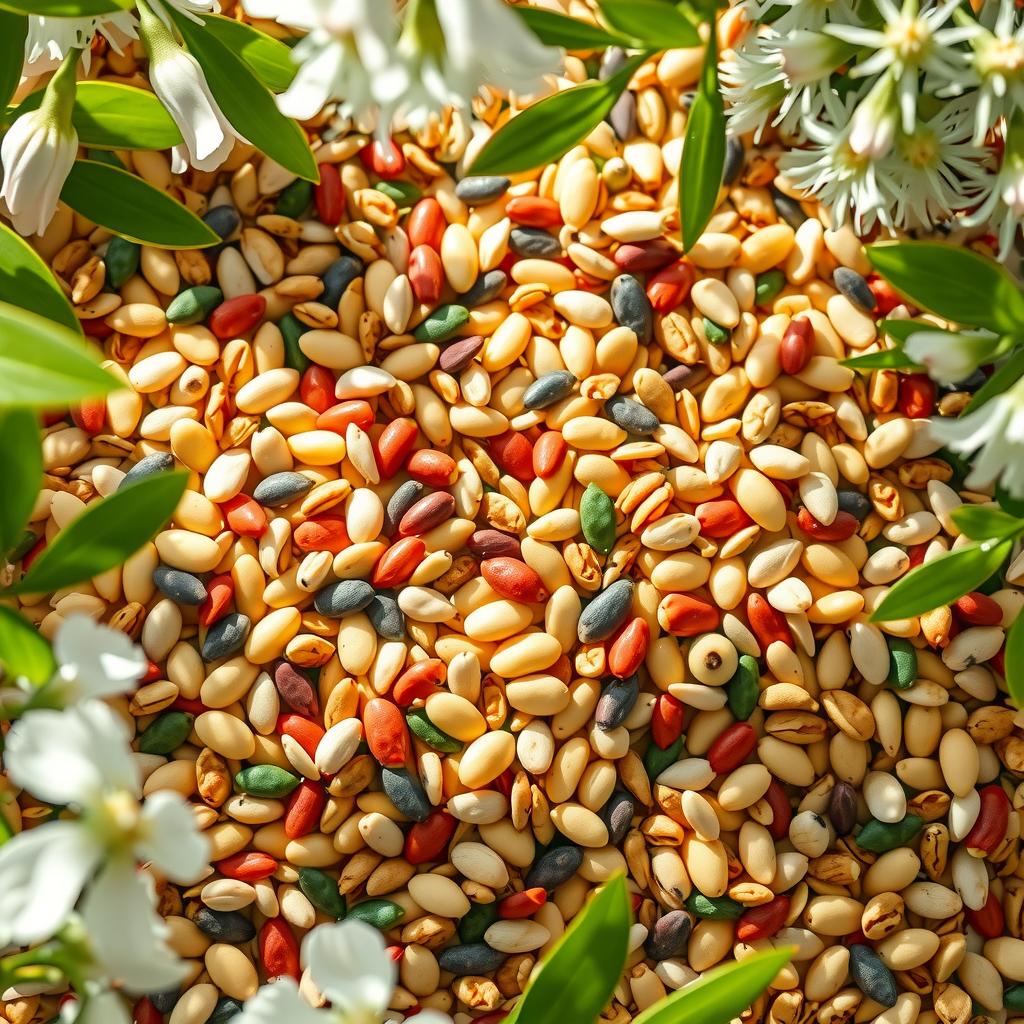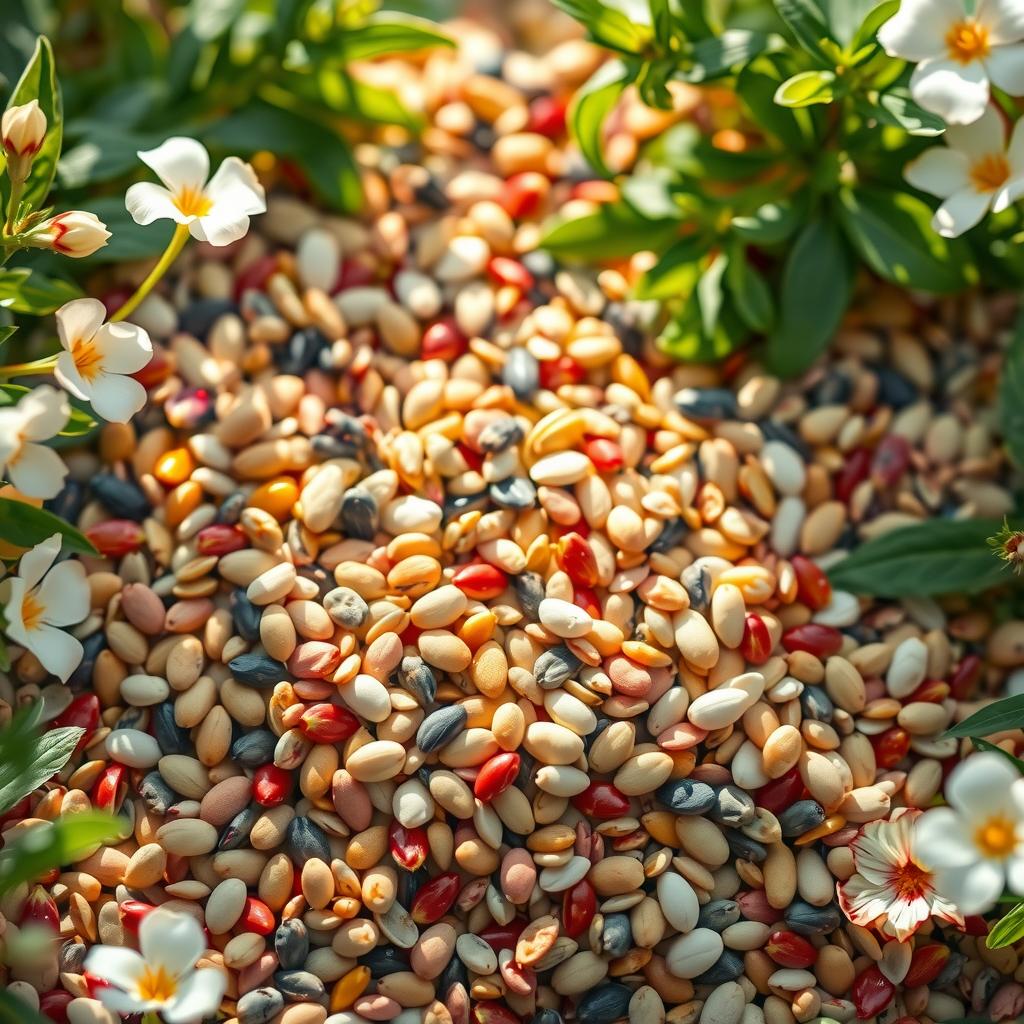Are pet owners truly aware of the nutritional needs of their beloved parakeets? As one of the most popular avian companions, these vibrant birds often rely heavily on their caregivers for a balanced diet that promotes health and longevity. The importance of providing quality nutrition cannot be overstated; it directly impacts not only their physical well-being but also their overall happiness and behavior. To ensure that parakeets thrive, many bird enthusiasts are turning to an organic seed mix, specially formulated to meet the dietary requirements unique to these feathered friends.
The core value of this article lies in exploring how an organic seed mix can enhance bird nutrition while offering peace of mind to pet owners concerned about what goes into their feathered companions’ diets. These mixes are designed with various organic seeds tailored specifically for parakeets, ensuring they receive essential nutrients without harmful additives or preservatives commonly found in conventional bird food. By opting for such natural products, caretakers can cultivate a healthier lifestyle for their pets—one filled with vigor and vitality.
As we dive deeper into this topic, readers will discover practical insights regarding avian care and feeding guides centered around choosing the best seed mixes available today. From understanding which types of seeds contribute beneficial vitamins and minerals to learning how to integrate them seamlessly into a parakeet’s diet, this article aims to provide comprehensive information that will empower pet owners in making informed decisions.
By transitioning towards using an organic seed mix, caregivers not only support sustainable farming practices but also prioritize the health benefits associated with organic ingredients. This change could potentially revolutionize feeding habits among those who may have previously underestimated its significance within avian care routines.
In conclusion, as readers embark on this journey through the world of parakeet food options—from traditional blends to innovative seed mixes—they will uncover vital knowledge necessary for cultivating a nutritious environment conducive to optimal growth and well-being. Thus begins our exploration into why choosing high-quality organic seeds is paramount for anyone dedicated to fostering happy, healthy lives for their cherished pet birds.

Essential Insights: A Guide to Healthier and Happier Birds
When it comes to ensuring the well-being of pet birds, particularly parakeets, selecting the right parakeet food is paramount. An organic seed mix specifically designed for these vibrant creatures can provide a balanced and nutritious diet that caters to their natural feeding habits. By incorporating high-quality organic seeds into their meals, owners can significantly enhance their feathered friends’ overall health and happiness.
The composition of an organic seed mix plays a crucial role in supporting bird nutrition. Ingredients such as millet, sunflower seeds, and flaxseeds not only offer unique benefits but also ensure that parakeets receive essential vitamins and minerals necessary for optimal health. This thoughtful approach transforms mealtime from mere sustenance into a celebration of life while promoting playful behavior through increased energy levels.
Moreover, choosing an organic seed mix helps mitigate exposure to harmful chemicals commonly found in conventionally farmed products. This conscious decision towards better avian care reflects a commitment to nurturing life sustainably while fostering trust between owner and pet. As caregivers embrace this mindful choice in parakeet food, they contribute positively not just to their pets’ diets but also to the larger ecosystem.
Understanding how simple dietary adjustments can lead to healthier lives for cherished feathered companions is vital for any bird owner. Following a comprehensive feeding guide ensures proper portion sizes and frequency when introducing an organic seed mix into your parakeet’s diet. With diverse flavors at play, these mixes provide both variety and nutritional value that elevate the overall dining experience for pet birds while reinforcing responsible ownership practices rooted in love.

Understanding Avian Nutrition: The Importance of a Balanced Diet
The Role of Nutrition in Parakeet Health
Proper nutrition is essential for the overall health and well-being of parakeets. Just like humans, these vibrant pet birds require a balanced diet to thrive and exhibit optimal behavior. A diet that lacks essential nutrients can lead to various health issues, including feather plucking, decreased immunity, and behavioral problems such as aggression or lethargy. To support their nutritional needs effectively, it is crucial for pet owners to understand the importance of incorporating a variety of foods into their parakeets’ diets. One recommended option is an organic seed mix, which provides not only seeds but also dried fruits and vegetables packed with vitamins and minerals necessary for avian care.
Essential Nutrients for Parakeets
In exploring bird nutrition, it becomes evident that different nutrients serve unique roles in maintaining the well-being of parakeets. Proteins are fundamental in supporting growth and muscle development; thus, high-quality protein sources should be included in their regular feeding regimen. Additionally, carbohydrates provide energy needed for daily activities while fats help maintain healthy skin and feathers. Vitamins such as A, D3, E, K along with several B-complex vitamins play critical roles in metabolic processes within birds’ bodies. An excellent way to ensure these vital nutrients are consumed by pet birds is through offering them an organic seed mix enriched with diverse ingredients designed specifically for their dietary requirements.
Behavioral Implications of Poor Nutrition
The impact of improper nutrition extends beyond physical health—it significantly influences parakeet behavior as well. Birds fed a monotonous diet often display signs of boredom or stress-related behaviors like excessive vocalization or destructive habits such as chewing on cage bars or toys incessantly. When provided with a varied diet rich in flavors—from fresh fruits to crunchy grains—parakeets tend to engage more actively within their environment leading towards improved mental stimulation and social interaction among themselves or even with human companions they bond closely with over time.. Incorporating an organic seed mix into daily meals can add excitement both visually appealing colors & textures while ensuring nutritional adequacy fostering happier pets from day one.
Guidelines for Feeding Your Parakeet
Creating an effective feeding guide requires understanding how much food your parakeet needs at different life stages alongside potential allergies they might have towards certain seeds or fruits too! Generally speaking adult parakeets thrive on about 1-2 tablespoons (15-30 grams) per day depending on activity levels whereas younger ones may need slightly more due increased energy demands during growth phases! It’s advisable always check local regulations regarding permissible foods before introducing new items into any bird’s menu especially when considering treats outside standard fare consisting primarily around quality pellets coupled alongside our favorite go-to’s: organic seed mixes. Regular monitoring ensures no sudden dips occur within body weight indicating something amiss requiring immediate attention potentially involving veterinary expertise if left unchecked could result disastrous consequences affecting overall happiness longevity alike! Thus forming good habits early regarding proper feeding practices helps cultivate healthier lifestyles promoting longevity thriving companionship throughout years spent together nurturing bonds shared so deeply treasured forevermore truly enriching lives all around us!
Choosing the Right Organic Seed Mix: Essential Ingredients for Optimal Health
The Importance of Selecting Quality Seeds
When it comes to avian care, selecting the right organic seed mix is paramount for ensuring optimal health in pet birds. A well-crafted seed mix not only provides essential nutrients but also caters to the unique dietary needs of different species. Various seeds included in these mixes each bring forth distinct benefits that can greatly enhance a bird’s overall well-being. For instance, sunflower seeds are often celebrated for their high-fat content and energy-boosting properties, making them an excellent choice for active birds. Similarly, flaxseeds contribute omega-3 fatty acids which are crucial for maintaining heart health and promoting a shiny plumage. When combined thoughtfully within an organic seed mix, these ingredients create a balanced diet that supports vigorous growth and longevity.
Nutritional Benefits of Diverse Seeds
Moreover, it’s important to recognize how specific seeds play vital roles in providing comprehensive nutrition. For example, millet is highly favored by many parakeets as it serves as an excellent source of carbohydrates while being light on the digestive system—a perfect fit when considering a healthy diet plan tailored to avian needs. Additionally, chia seeds offer significant fiber content along with protein; they swell up when soaked in water which aids hydration—an often overlooked aspect in bird nutrition. These nutritional powerhouses should be natural staples within any organic seed mix, ensuring that every bite contributes positively towards fulfilling your pet’s dietary requirements.
Crafting Your Ideal Seed Mix
In crafting an ideal organic seed mix, one must consider both preference and nutritional value simultaneously; this approach not only enhances feeding experiences but also aligns closely with best practices outlined in various feeding guides available today. By incorporating elements such as pumpkin seeds—which are rich in zinc—owners can support their birds’ immune systems effectively while offering variety through taste and texture preferences at mealtime. Furthermore, integrating herbs like dandelion greens or nettles into the seed blend can provide additional vitamins and minerals conducive to feather health and digestion without overwhelming delicate palates accustomed primarily to grains or nuts found within standard offerings of parakeet food. Henceforth creating a personalized organic experience empowers owners toward achieving better engagement during feedings while promoting enhanced vitality among their cherished companions.
Ultimately, understanding the individual contributions made by each component allows bird owners to feel confident about what they serve daily—leading directly back into fostering healthier pets through conscious choices involving nutrient-dense options seamlessly wrapped up inside quality organic seed mixes designed specifically with avian care at heart.
Feeding Guidelines for Parakeets: Ensuring Variety and Nutritional Value
Understanding Portion Sizes and Frequency of Feeding
When it comes to feeding parakeets, understanding portion sizes is crucial for ensuring their health and well-being. Generally, a healthy diet for these vibrant pet birds should consist of approximately 1-2 tablespoons of high-quality food per bird each day. This amount can vary based on the individual bird’s size, age, and activity level; thus, monitoring their weight can help determine the appropriate portions. A mix that incorporates an organic seed mix provides essential nutrients while keeping mealtime exciting. It is advisable to offer fresh seeds in small amounts throughout the day rather than all at once to prevent waste and encourage natural foraging behaviors. Additionally, introducing fresh fruits and vegetables into their diet two to three times a week enhances nutritional diversity while stimulating interest during mealtime. Foods such as leafy greens or apple slices not only provide hydration but also contribute vital vitamins important for overall avian care.
Making Mealtime Enjoyable
To keep mealtime enjoyable for parakeets, consider incorporating interactive feeding methods alongside traditional bowls filled with an organic seed mix. For instance, using hanging feeders or scattered seeds around their cage encourages playful behavior as they search for food—this mimics natural instincts found in wild environments where birds forage for sustenance among foliage. Furthermore, varying the types of vegetables offered can maintain excitement; options like carrots or bell peppers introduce different textures and flavors that stimulate your feathered friend’s palate while enriching their diet with additional antioxidants necessary for robust health. It’s also beneficial to establish a feeding routine so that your parakeet becomes accustomed to specific meal times which fosters security within its environment—a key aspect of effective avian care.
Importance of Nutritional Balance
Incorporating variety into a parakeet’s daily intake is fundamental not just as a source of enjoyment but also as part of achieving nutritional balance critical in promoting longevity among pet birds. An ideal blend consists predominantly of seeds complemented by pellets specifically designed with fortified vitamins tailored towards bird nutrition needs—these ensure comprehensive dietary coverage that an organic seed mix alone may lack when fed exclusively over time. Remembering this balance helps avoid deficiencies commonly seen if one type prevails without supplementation from other sources like grains or legumes rich in proteins necessary during molting periods when energy demands rise significantly due to physical changes happening within feathers’ growth cycles too! The establishment ensures optimal wellness which ultimately reflects positively back upon owners watching them thrive under attentive guardianship towards fostering lifelong companionship enjoyed through shared moments together each day spent caring collectively about maintaining healthy lifestyles nourished adequately every step along way forward ahead!
In the quest for ensuring that parakeets receive a balanced and nutritious diet, selecting the right organic seed mix plays a crucial role. Owners must understand that a thoughtfully crafted parakeet food option can make all the difference in promoting their feathered friends’ long-term health and happiness. An ideal organic seed mix combines essential nutrients while reflecting the natural feeding habits of these vibrant birds. The presence of high-quality ingredients not only enriches their diet but also contributes significantly to overall well-being.
When assessing what constitutes a healthy diet for pet birds, incorporating an organic seed mix rich in vitamins and minerals is paramount. Many blends feature seeds such as millet, sunflower seeds, and flaxseeds—each providing unique benefits vital to maintaining optimal health. Adhering to a comprehensive feeding guide will assist owners in determining appropriate portion sizes and frequency, allowing their parakeets to enjoy diverse flavors without sacrificing nutritional value found within an excellent organic seed mix.
The advantages of choosing organic options extend beyond mere nutrition; they also reduce exposure to harmful chemicals commonly associated with conventional farming practices. By selecting an organic seed mix, caregivers demonstrate responsible avian care by consciously opting for healthier choices for their pets. This decision fosters both trust between owner and bird while enriching mealtime experiences through mindful dietary selections tailored specifically for each individual parakeet.
FAQ:
Q: How often should I feed my parakeet an organic seed mix?
A: It is recommended to provide your parakeet with fresh food daily alongside the organic seed mix, adjusting based on your bird’s specific needs and preferences.
Q: Can I supplement my parakeet’s diet with fruits or vegetables along with the organic seed mix?
A: Yes! Supplementing an organic seed mix with small amounts of fresh fruits or vegetables can enhance your pet’s nutrition while adding variety to their meals.
Q: Is it necessary for all pet birds to have access to an organic seed mix?
A: While not mandatory, providing an organic seed mix is highly beneficial as it ensures that your pet receives quality nutrition free from harmful additives typically found in non-organic options.

